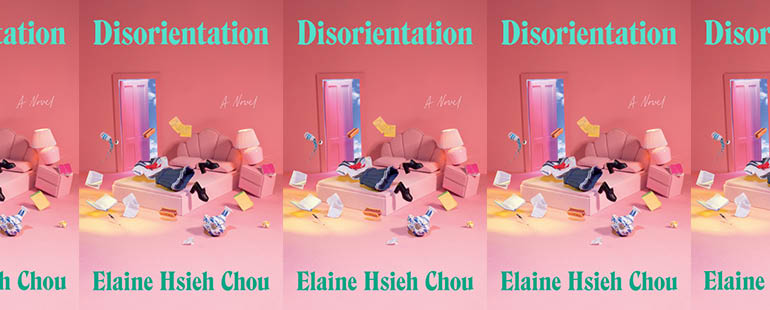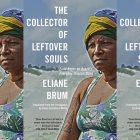Personal and Academic Pursuits in Elaine Hsieh Chou’s Disorientation

Disorientation
Elaine Hsieh Chou
Penguin Press | March 22, 2022
Elaine Hsieh Chou’s debut Disorientation is an inventive campus novel that satirizes academia in an over-the-top, compulsively readable mystery. Ingrid Yang, a 29-year-old Taiwanese American graduate student, is overwhelmed and defeated in her final year of graduate school. In the opening chapter, Ingrid stresses over the student loan debt she needs to pay after graduation, considers whether it’s too late to become an accountant, hopes her stomach cramps mean she’s developing ulcers that will warrant skipping her schoolwork, and visits the archive to work on her dissertation that she needs to finish this year. Ingrid’s research focuses on the late Xiao-Wen Chou, a fictional canonical Chinese American poet, who previously taught at Barnes University where Ingrid is pursuing her PhD. But then Ingrid finds a mysterious note in the archives that corrects her notes on the location in one of Xiao-Wen Chou’s poems. Ingrid abruptly drops her dissertation research, avoiding her advisor, and follows the clues to uncover an academic conspiracy that reveals deeply ingrained anti-Asian sentiments and has the potential to upend her research, her department, and her school.
The search for the truth that Ingrid embarks on isn’t calculated—it’s bumbling, and delightfully so. Ingrid spends money she doesn’t have on an awful private detective that leads nowhere. She illegally accesses archive donor files using a tampon as a distraction device (a conveniently timed clogged toilet). She sits through hours-long stake outs with little to show besides empty snack wrappers. Ingrid also recruits her best friend Eunice Kim, another graduate student whose dissertation focuses on Hegelian ethics in K-dramas, and who enjoys reality TV and junk food as much as Ingrid, to accompany her in these hijinks. This makes for an absurd and hilarious read—and it underscores lengths Ingrid will go to avoid writing her dissertation, and thus avoid leaving school for the first time as an adult.
Ingrid’s clumsy pursuit of truth about the note in the archive is absurd and hilarious, but Chou’s novel isn’t light. The narrative explores pervasive anti-Asian racism, particularly in academia. Ingrid originally intended on focusing her graduate studies on modernist poetry, but she was dissuaded by Michael Bartholomew, the chair of the East Asian studies department. Michael offers compelling reasons to study Xiao-Wen Chou instead, such as more funding, more job prospects, more opportunities. But the real meaning is thinly veiled: studying Xiao-Wen Chou isn’t more marketable but more marketable for Ingrid, an Asian American woman.
Ingrid’s gradual realization of the barely subtle, ever-present racism in the department, at Barnes, and in its town, Wittlebury, parallels her pursuit of the truth about the note. At the beginning of her pursuit, when the awful, and white, private detective chides Ingrid for describing slurs as racist, we see Ingrid hesitate and acquiesce, avoiding using the term. By the winter quarter, however, she joins the POC Caucus, protesting problematic casting in a play on campus. It’s this storyline that holds some of the most tender moments of the book. When Ingrid discusses her experience growing up Taiwanese American in a small, predominantly white town in Massachusetts with her parents, for the first time Ingrid’s parents share how she would walk away and pretend not to know them if they spoke Mandarin in public, and Ingrid remembers. When her dad asks if she’d speak Mandarin with them again, Ingrid promises to in time.
Chou excels at capturing these complicated relationships with clarity and closeness, as well as with an eye for the alarming blind spots that Ingrid has for many people in her life. Ingrid’s fiancé, Stephen Greene, for example, is a white Japanese translator who doesn’t speak Japanese and has never visited the country but taught himself to read and write the language after college. The novel is primarily told in close third-person, focusing on Ingrid’s perspective, but Chou ensures Stephen’s actions suggest his faults. Even more, Chou grounds Ingrid’s feelings about her relationships, including her engagement, in the context of graduate school. Ingrid explains succinctly why she’s so excited about marrying Stephen: “Much like tenure, marriage would offer her a deliciously concrete sense of security.” The way Ingrid’s PhD program defines all aspects of her life, especially her relationships, doesn’t only ring true—it also reads as unhealthy, adding another layer to Chou’s satire of academia.
Of course, Chou’s biggest critique of academia throughout the novel is racism. Chou constructs a cast of characters who are over-the-top and humorous, but their problematic actions and beliefs are clear. We see it with Michael Bartholomew, the East Asian studies chair who chooses Ingrid’s dissertation focus in the program and orders for her when they meet at cafes, all the while fetishizing Chinese culture, and even Stephen, the Japanese translator who is ultimately unfamiliar with the country and the language. But it’s the character who serves as a foil for Ingrid that prompts Ingrid to recognize not only the microaggressions perpetuated by members of the campus community, but also the racist practices in the department and university. Vivian Vo is a fifth-year PhD student who won the prestigious fellowship Ingrid applied for, published a handful of peer-reviewed articles, and is also writing her dissertation on Xiao-Wen Chou, though she’s approaching the author and the texts from an anthropological perspective. Vivian is also a vocal member of the POC Caucus, and she is uninterested, and apparently unimpressed, by Ingrid and her research. Ingrid hates her and envies her, which isn’t mature, but it is understandable. However, when Ingrid finds the note, she turns to Vivian in the archive to ask her opinion. And, as the novel and Ingrid’s search unfolds, Ingrid seeks out Vivian and her scholarship to understand her feelings about what she’s seeing—for example, in the racist depictions of Asian American characters in the campus play. Vivian teaches Ingrid not only terms and theories, but, more importantly, to think critically about these interactions, about this institution, and it’s this realization that’s perhaps the most significant for Ingrid as she grapples with her feelings, her relationships, and her identity. Ingrid’s tenuous relationship with Vivian doesn’t seem like it would last quarter to quarter, let alone after the schoolyear. But Vivian’s influence promises to stay with Ingrid long after she leaves campus.
As Ingrid follows the clues to the mystery at the center of the novel, it’s this looming deadline for Ingrid’s expulsion into the real world that elevates the pressure on Ingrid and moves the story forward. Ingrid’s identity as a graduate student is central to the novel, and Chou captures this experience expertly—the spirit of department politics, the competition between grad students, the deep sense of insecurity in your research, your future, yourself. Her identity is layered with her identity as a Taiwanese American woman; Ingrid’s experience with her research subject is complicated by her largely white department and her own experience growing up in a white town. It’s this complexity and Ingrid’s personal journey over the course of the academic year that makes Disorientation not only an outrageously enjoyable academic mystery, but also a moving portrayal of self-discovery.



